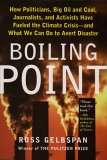Summary | Excerpt | Reviews | Beyond the Book | Readalikes | Genres & Themes | Author Bio
How Politicians, Big Oil and Coal, Journalists and Activists Are Fueling the Climate Crisis--and What We Can Do to Avert Disaster

Critics' Opinion:
Readers' Opinion:
First Published:
Jul 2004, 272 pages
Paperback:
Nov 2005, 304 pages
 Book Reviewed by:
Book Reviewed by:
BookBrowse Review Team
Buy This Book
That prediction was realized in September, when Bush refused to attend the 191-nation summit--despite the presence of an array of world leaders, and despite the fact that a predecessor summit in 1992 in Rio had been attended by his father, President George H.W. Bush.
Not only did George W. Bush refrain from attending, he also saw to it that the plans of other nations to launch a major clean-energy initiative were thwarted by the United States and some of its oil-producing allies. In the run-up to Johannesburg, a number of countries, led by the EU, put the issue of renewable energy near the top of the world's sustainability agenda. But near the end of the meeting, the United States, acting through the Saudi Arabian and Venezuelan delegations, pushed through a resolution that would maintain coal and oil as the world's primary fuels.
'We have lost an opportunity to move forward substantially on renewable technologies internationally,' said Michael Marvin, executive director of the U.S. Business Council for Sustainable Energy. 'If we're truly looking to change patterns of investment, this doesn't do it.'
After a week of deadlocks and multiple drafts, the delegates finally agreed on the role of energy in future development. But the final resolution endorsed such unsustainable technologies as clean coal and large-scale hydropower. Most tellingly, it required no deadlines or timetables for action.
The consequences of the Bush administration's behavior-on this and other fronts--may well have far-reaching diplomatic, as well as climatic, consequences.
'The U.S. decision on Kyoto could become a turning point in trans-Atlantic relations,' wrote Jessica T. Mathews. In an article in Foreign Policy, Mathews, who is president of the Carnegie Endowment for International Peace, noted that the Bush administration turned its back not only on Kyoto but also on four other major international compacts: the International Criminal Court, the ban on antipersonnel land mines, the biodiversity treaty, and the Biological Weapons Control Treaty.
In refusing to support these compacts, the United States was ignoring the accelerating integration of Europe, she asserted. 'Economically, the EU is no longer a junior partner. It has a larger population than the United States, a larger percentage of world trade, and approximately equal gross domestic product,' she wrote at the end of 2001.
Climate change is the leading edge of an increasing number of problems that are truly global in scope. And these issues create a need for new rules that 'nibble away at the edges of national sovereignty'--a trend that runs directly counter to the neo-nationalism of the Bush administration.
This 'à la carte multilateralism'--in which the United States decides which issues it is willing to cooperate on--'is not an approach that goes down easily' in the rest of the world, Mathews wrote.
Her conclusion: The current U.S. posture, which is epitomized by the U.S. position on climate change, could well result in the loss of America's position as global political leader.
'America's interests, not to mention its legitimacy and capability as a world leader, are better served by [participating] in shaping rules and procedures rather than in sulking outside the tent. Though Europe cannot challenge U.S. political or military supremacy, the world's single superpower must acknowledge that its power no longer translates . . . into a community of Western democracies and Third World dependents ready to fall into line behind U.S. leadership.'
Mathews's article, written shortly after the terror attacks in September 2001, apparently fell on deaf ears.
With the Bush administration's success in assembling a coalition against terrorism--and its subsequent 'coalition of the willing' to support the war in Iraq--the administration has, in fact, been quite successful in 'cherry picking' issues on which it wants international agreement.
From Boiling Point by Ross Gelbspan, pages 93-126 of the hardcover edition. Reprinted with Permission from Basic Books – Copyright 2004.





The House on Biscayne Bay
by Chanel Cleeton
As death stalks a gothic mansion in Miami, the lives of two women intertwine as the past and present collide.

The Flower Sisters
by Michelle Collins Anderson
From the new Fannie Flagg of the Ozarks, a richly-woven story of family, forgiveness, and reinvention.

The Funeral Cryer by Wenyan Lu
Debut novelist Wenyan Lu brings us this witty yet profound story about one woman's midlife reawakening in contemporary rural China.
Your guide toexceptional books
BookBrowse seeks out and recommends the best in contemporary fiction and nonfiction—books that not only engage and entertain but also deepen our understanding of ourselves and the world around us.